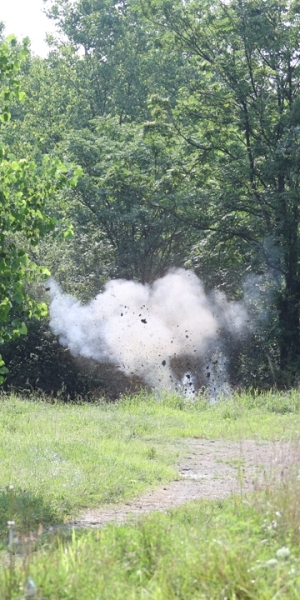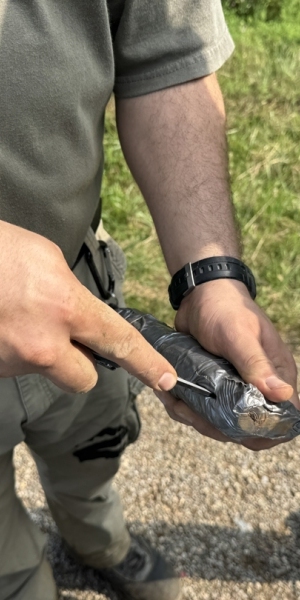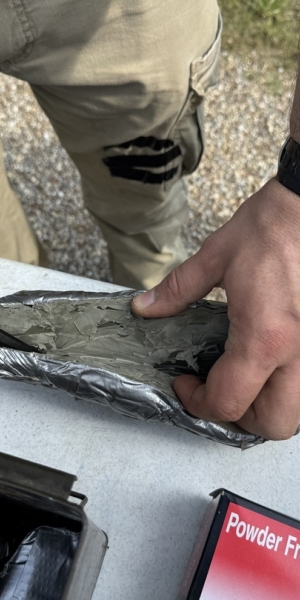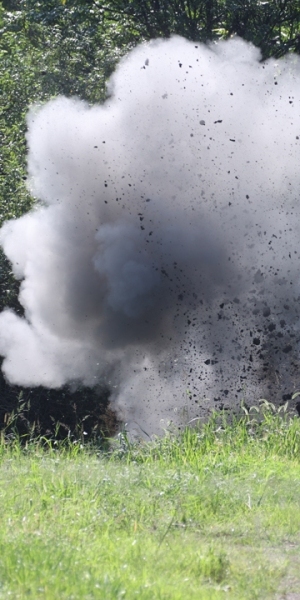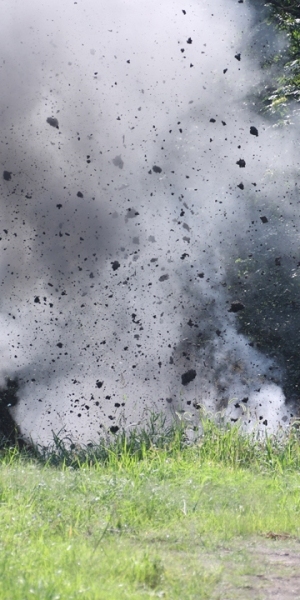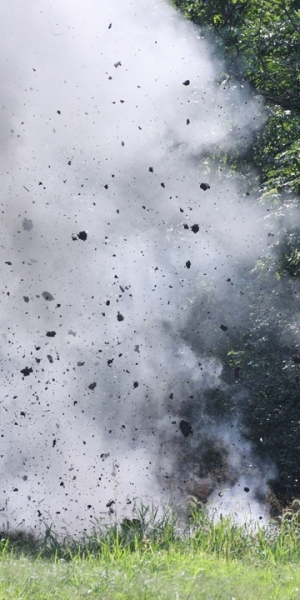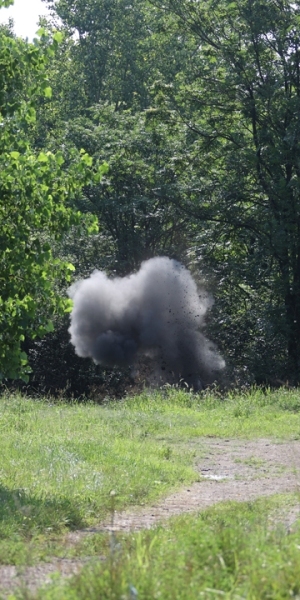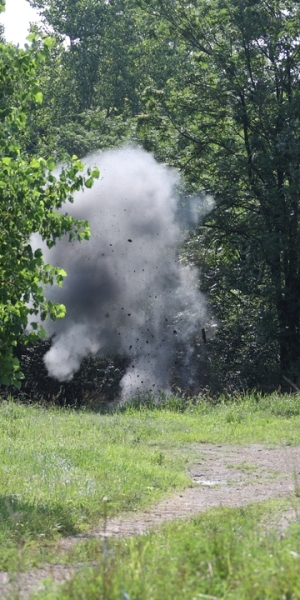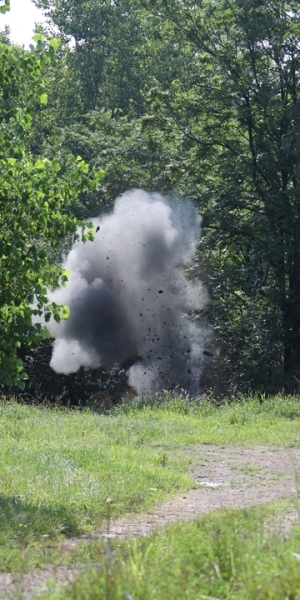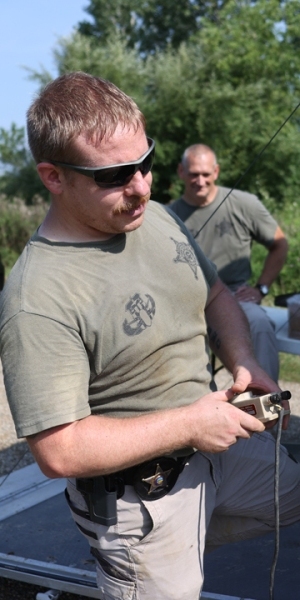Ashland County Bomb Squad Turns Danger Into Dust: From Grandpa’s Dynamite to Landmines, They Handle It All With a Smile and a Big Boom
ASHLAND COUNTY, OH – Few people can say their workday involves handling unstable dynamite, disarming mysterious contraptions in pickup trucks, or detonating live landmines—and still clocking out in time for dinner. But for the five-member Ashland County Sheriff’s Office Bomb Squad, it’s just another day.
Yesterday, the team—led by Bomb Squad Commander Sgt. Josh Early—was out in a remote area disposing of a stockpile of recovered explosives from calls they’ve handled this year. The “donations” came from all over: dusty barns, forgotten attics, and the occasional overly curious farmer.
“Most of our calls start with, ‘Hey, Grandpa had this stuff in the barn. Don’t know what it is, but I think it’s dynamite,’” Early said with a grin. “We’ve also had old hand grenades, mortar shells, decades-old ammunition—you name it, we’ve dealt with it.”
The “grandpa specials” might sound funny, but the danger is real. Early showed a sample of dynamite that had begun to crystallize—tiny white shards forming on its surface as it slowly leaked nitroglycerin. “Once that happens, it’s extremely volatile,” he explained. “Even a light touch can cause a sympathetic detonation, where the crystal explodes and sets off the whole stick. That’s why it’s a really good thing people call us rather than trying to move it themselves.”
The Crew: Humor Under Pressure
While the dangers are serious, the squad’s camaraderie is anything but serious. Watching them work, you quickly realize humor is part of the toolkit—right alongside C4 and blasting Caps.
Early’s right-hand man, Deputy Joe Titus, has earned a reputation as, in Early’s words, “my sharpest blunt instrument. If I need a job done, I know who to call.”
Between detonations, the crew playfully rib each other, testing one another with “bomb puzzles”—wiring scenarios meant to sharpen their skills. They train for 24 hours a month, including eight hours handling real explosives, to ensure nothing gets sloppy. “We like to challenge each other,” Early said. “Keeps us sharp, and honestly, it keeps things interesting.”
And if you think Hollywood gets bomb work right, Early laughs. “It’s not The Hurt Locker. There’s no universal ‘red wire to cut.’ Every device is different. We spend far more time tracing and analyzing how something functions before we even think about touching it.”
When they do touch it, Expect noise.
While most of their work involves small, controlled detonations, the squad isn’t immune to the occasional “fireworks show.” Early recalled a recent landmine disposal that required “four pounds of C4.” His assessment? “That was a big boom. A very large boom. People complain when we’re too loud, but safe disposal sometimes means making noise. We’d rather rattle a few windows than have someone kick a live explosive by accident.”
A Word From Sheriff Kurt J. Schneider
Ashland County Sheriff Kurt J. Schneider knows bomb work better than most—he spent much of his Fire Investigating/Law Enforcement career as a technician himself, graduating from the same FBI Hazardous Devices School that now trains his team.
“The Ashland County Sheriff’s Office is one of 19 FBI-certified EOD (Explosive Ordnance Disposal) or ‘Bomb’ Teams in the State of Ohio,” Schneider said. “We cover four of the state’s 88 counties, but we’ll respond anywhere we’re needed. Our technicians and team members are part of an elite group of highly trained individuals who stand ready, 24 hours a day, to counter threats involving HME (Homemade Explosives), IEDs (Improvised Explosive Devices), and any other incidents where explosives might be involved.”
He added that the squad plays an essential role beyond bomb calls: assisting with hazardous materials, special operations, and even remote operations where robots are deployed to protect human life.
“We’re honored to have staffed one of these FBI-recognized units for almost 50 years,” Schneider said. “Nearly all of our specialized equipment comes through federal funding, but we also rely heavily on the generosity of local groups and agencies who help provide equipment, training, and supplies to keep us operating at the highest level.”
How America’s Bomb Squads Began
While bomb disposal began as a military function during World War II, U.S. law enforcement didn’t officially create bomb squads until the late 1940s, when post-war surplus explosives and a surge of mob bombings made the need clear.
New York City formed one of the first municipal bomb squads in 1941, followed by Los Angeles in 1947. The rise of domestic terrorism in the 1970s—groups like the Weather Underground—pushed agencies nationwide to establish permanent units.
In 1971, the FBI opened the Hazardous Devices School at Redstone Arsenal to train and certify every bomb technician in the country, from small-town sheriffs to major metropolitan teams. To this day, no one straps on a bomb suit without surviving those six weeks.
Serving with a Smile (and Sometimes a Boom)
For Sgt. Early and his crew, it’s all about protecting people—whether that means hauling away Grandpa’s grenades or defusing a genuine threat. “We’re here to make sure the dangerous stuff gets dealt with safely,” Early said. “Every time we make a controlled detonation, that’s one more disaster we’ve prevented.”
The Takeaway
Yes, there’s humor, camaraderie, and the occasional booming spectacle, but the Ashland County Bomb Squad’s mission is serious: keeping the community safe from explosives old and new. Whether it’s stabilizing a box of crystalizing dynamite or calmly investigating what turned out to be a homemade hydrogen generator (“Guy was just trying to make his F-150 a hybrid,” Early chuckled), they show up, suit up, and get the job done.
So, the next time you hear a boom in the distance, don’t panic. Chances are, it’s just the Ashland County Bomb Squad—keeping the county safe, one blast at a time. And maybe, just maybe, they enjoy the occasional window-rattling “boom” a little more than they let on.
Former Sheriff E. Wayne Risner summed it up best: “Having this capability here is a tremendous asset. These technicians train relentlessly so they can run toward the danger everyone else is running from.”
“What to Do If You Find Suspicious Material”
Do NOT touch it. Even old or “rusty” explosives can still detonate.
Call your local law enforcement immediately. Ask for the bomb squad.
Clear the area. Keep people and pets at least several hundred feet away.
Don’t try to move it yourself. Even “stable-looking” explosives can be triggered by vibration or pressure.
Let the professionals handle it. They’ve got the training—and the C4.

